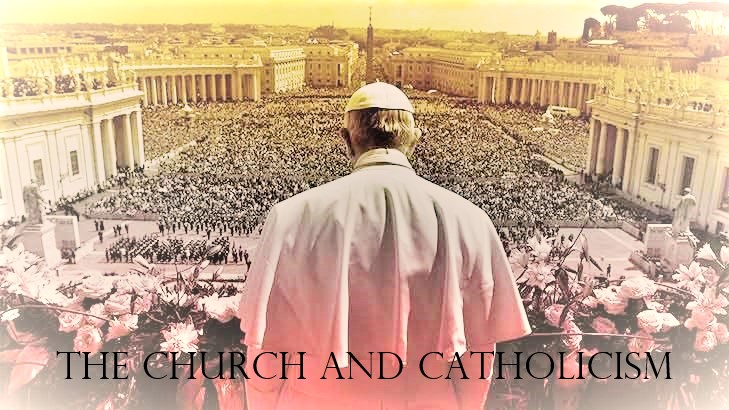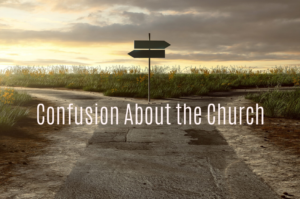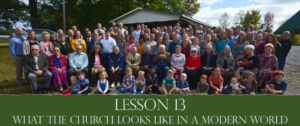The series on The Church is still ongoing if you forgot about it. The last lesson in discovering the church of the Bible was entitled The Church: Is There Only One? Click the link to refresh your memory about God’s narrow way that is paved by His one true church. In that lesson, we proposed that the Church of Christ is the church we read of in the Bible. However, that must be proven rather than arbitrarily stated. In the pursuit of proving that as fact, we start an examination of the major denominational influences that stand in the way. Lesson 7, then, is a five minute analysis of the Catholic Church, determining if its foundation and practice accords with the biblical pattern of God.
Where to Start
Much could be spouted in this examination of Catholicism. We could pull back the covers of many different Catholic beliefs and practices, exposing their indecency. A few such Catholic dogma include the immaculate conception of Mary (how God preserved Christ from inheriting sin through the flesh), original sin, infant baptism, the perpetuated earthly priesthood, the forbidding of marriage among clergy, the veneration and prayer to deceased saints, sainthood, the imparting of grace by the seven sacraments, transubstantiation, justification by works of merit, the apostolic succession of Peter, and ex cathedra (the infallibility and irreformable nature of the pope’s authority when on his seat of office). That is a whopping list. Someone turn up the A/C; I worked up a sweat just typing all that! Five minutes does not allow an examination of each of these doctrines, and so we shall confine our attention to the mighty, Catholic cornerstone which underlies and upholds each one of the dogmas just listed.
Apostolic Succession
The Catholic church boldly declares that Peter’s authority was and is still transferred to each archbishop (pope) in succession. This single belief is what all Catholic dogma stands and falls on. Traditionally, this doctrine arises from a narrow interpretation of Matthew 16:13-20. All interpretations that would here have Jesus blessing Peter as the church’s first holy pontiff is an interpretation that ignores Jesus’ allusion to Himself in Old Testament prophecy of Daniel as the Rock and Son of Man on which the kingdom of heaven is founded. For a brief, critical examination of Matthew 16:13-20 and what Jesus is there teaching, click here. The Catholic church prescribes that if this doctrine of apostolic succession is true, then God’s full weight of authority and infallibility is levied upon the succeeding popes until the end of time. The offspring of this doctrine can be condensed to three main principles-
Authority, Infallibility & Tradition
1) Authority-
“The pope is judged by nobody,”
says Ludwig Ott in his Catholic systematic theology The Fundamentals of Catholic Dogma. This doctrinal statement is blasphemous, having given the Roman Catholic pontiff the uncontested power to slay hundreds and thousands of innocent men and women who refused to concede to this lie throughout history (see William Tyndale’s burning at the stake, the approximate 300 protestants martyred during the English Reformation, and the deadly Catholic inquisitions of the 13-15th centuries). More than once after the translation of the Bible into the common tongue, papal authority allowed Catholic bishops the power to burn such translations in effort to maintain the Catholic church’s blinding influence among the masses (see Pope Martin V’s burning of the Wycliffe Bible in 1428 and the Catholic Bishop of London’s burning of the Tyndale New Testament in 1526). Such examples of tyranny are enough to refute the authority invested to the pope by the straw man interpretation of Matthew 16. There is a reason Jesus Christ commissioned His authority to twelve men and not a singular individual. Even then, God saw fit that divine revelation and authority should eventually rest in nothing other than His Holy Word, written by hands led by the Holy Spirit (2 Peter 1:19-21; 1 Cor. 13:8-13; Eph. 3:1-5; 4:7-13; Jude v. 3). Certainly, God saw the terrible tragedies that would result should He invest His authority into a single, unopposed human being, and that transmitted in eternal succession.
2) Infallibility-
After the Council of Trent, in which all who denied Peter’s apostolic succession were cursed as anathema, the First Ecumenical Council of the Vatican (1869–1870) officially pronounced ex cathedra as Catholic dogma. Ex Cathedra is the belief that when the pope speaks in the exercise of his office, and not necessarily in routine daily affairs, that he possesses infallibility in concern to doctrines of faith and morals (see Papal Encyclicals Online). Ludwig Ott, defines this doctrine as follows-
“The pope is infallible when he speaks ex-cathedra. Definitions of the Roman pontiff are irreformable. The source of his infallibility is the supernatural assistance of the Holy Ghost who protects the supreme teacher from error. God in heaven will confirm the pope’s judgment. He is preserved from error.”
Again, this doctrine is predicated on the Catholic interpretation of Matt. 16:13-20, and we place this in the same flame of fire as apostolic succession. This doctrine is unfounded by Scripture and receives the curse of Paul, “But even if we, or an angel from heaven, preach any other gospel to you than what we have preached to you, let him be accursed,” (Gal. 1:8 NKJV).
3) Tradition-
This point requires mentioning for the sake of comprehensiveness. Needless to say, the doctrines of apostolic succession and papal infallibility have created a slew of Catholic traditions, several mentioned at the very beginning of this lesson. Faithful Catholics emphasize again and again the supremacy and invaluable nature of Catholic tradition. Yet, for being so invaluable, the supplemental claim is that nothing in Catholic tradition contradicts Scripture. A Catholic Christian will most often admit, “Yes, you can be saved by following nothing other than what is found in Scripture.” And even though the Council of Trent declared anathema to anyone denying Peter’s primacy, the Catholic Church still believes that all Christians, regardless of denominational affinity is a saved child of God. Pope Francis even espouses that all one has to do is obey his conscience, that is all (Click Here). The plea for tradition seems weak…because it is. Tradition is, in fact, the only thing supporting the Catholic church.
Conclusion
Why does the Catholic Church fail the test? How do we know it is not the one true church of the Bible? Because it is built on a false premise and man made traditions. History has established this fact very well. I do feel very strongly about the heresy that is Catholicism. At the same time, I have several Catholic friends and acquaintances. Exposing the Catholic Church hierarchy and system of faith as blasphemous is not a personal attack on anyone that is Catholic. There are certainly many a sincere Catholic, for I have met them. Sincerity and truth are not married though (i.e. 1 Sam. 13:12). And to all of the Catholic persuasion, I do lovingly plead for repentance, salvation, and an appeal to the Church of Jesus Christ.


